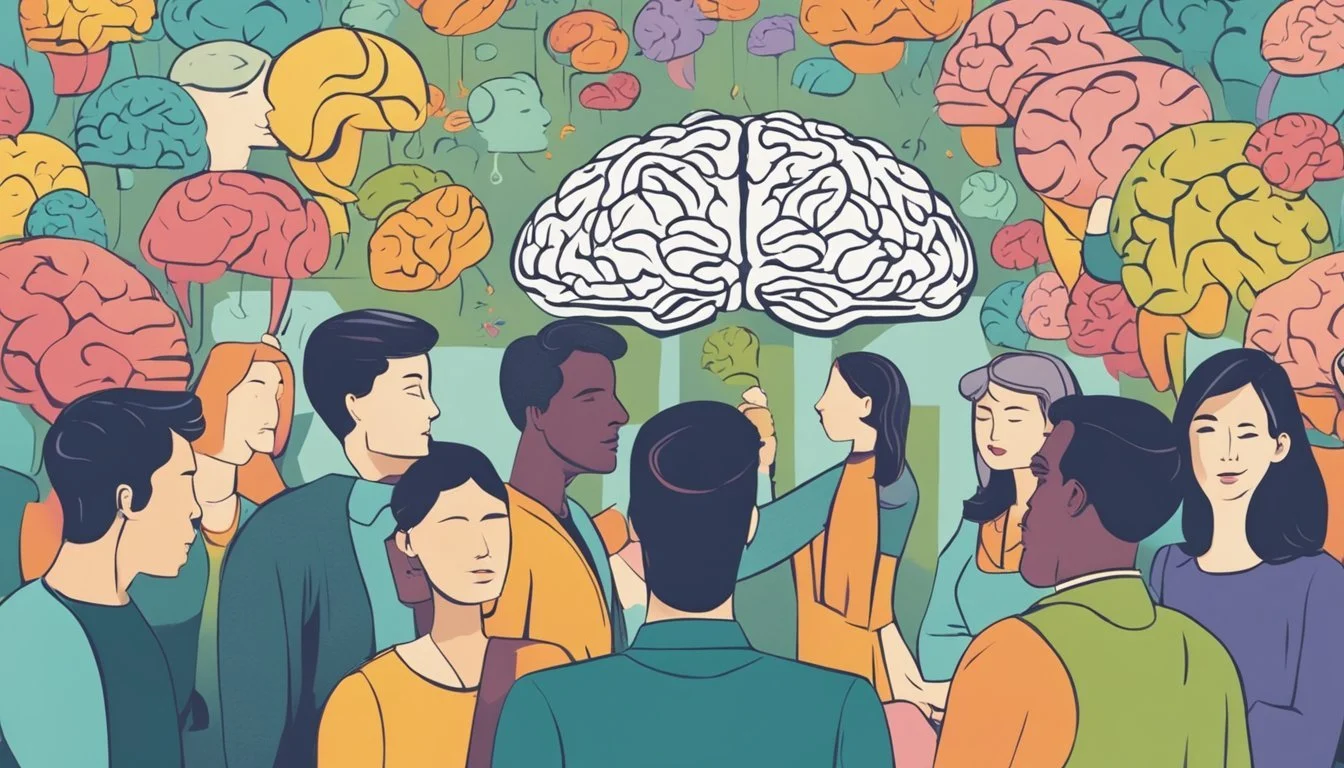9 Ways High Intelligence Can Hinder Social Skills
Understanding the Cognitive-Social Disconnect
Intelligence and social skills are often viewed as separate attributes, yet they can significantly influence each other. While high intelligence is generally considered an advantage, it can sometimes present challenges in social interactions. This apparent paradox has intrigued researchers and individuals alike, leading to a deeper exploration of the relationship between cognitive abilities and social competence.
High intelligence can impact social skills in various ways, affecting how individuals perceive, process, and respond to social cues. Understanding these potential hindrances can provide valuable insights for highly intelligent people seeking to enhance their social interactions. By examining specific behaviors and thought patterns associated with high intelligence, it becomes possible to identify areas for improvement and develop strategies to overcome social obstacles.
1) Overthinking social interactions
Highly intelligent individuals often struggle with overthinking social interactions. Their analytical minds can lead them to excessively analyze every aspect of a conversation or encounter.
This tendency to overanalyze can cause hesitation and awkwardness in social situations. Intelligent people may spend too much time considering potential responses, leading to unnatural pauses in conversation.
The fear of saying the wrong thing can paralyze socially anxious individuals with high IQs. They may become preoccupied with how others perceive them, hindering their ability to engage naturally.
Overthinking can also manifest as excessive rumination after social events. Intelligent people might replay interactions in their minds, scrutinizing every detail and imagining alternative scenarios.
To combat this issue, practicing mindfulness techniques can help ground individuals in the present moment. Focusing on active listening rather than formulating perfect responses can improve social interactions.
Accepting that not every social encounter needs to be flawless can alleviate some of the pressure intelligent people place on themselves. Embracing imperfection and spontaneity in conversations can lead to more authentic connections.
2) Difficulty relating to others' perspectives
Highly intelligent individuals often struggle to understand and relate to the viewpoints of those with different cognitive abilities. Their advanced reasoning skills can create a gap in comprehension when interacting with others.
This difficulty stems from the tendency to process information more quickly and complexly. Highly intelligent people may find it challenging to simplify their thoughts or slow down their mental processes to match others' pace.
They might assume that everyone perceives and analyzes situations in the same way they do. This assumption can lead to misunderstandings and frustration in social interactions.
Additionally, their ability to see multiple facets of an issue can make it hard to grasp why others might hold simpler or more straightforward views. This complexity in thinking can create barriers in everyday conversations and relationships.
Empathy may also be affected, as highly intelligent individuals might struggle to emotionally connect with experiences they perceive as less intellectually stimulating. This can result in appearing distant or unsympathetic, even when they don't intend to be.
3) Preference for solitude
Highly intelligent individuals often exhibit a strong preference for solitude. This inclination stems from their ability to find fulfillment in independent pursuits and intellectual endeavors.
Many bright minds relish the opportunity to engage in deep thinking and creative projects without external distractions. Solitude provides them with the mental space needed to explore complex ideas and develop innovative solutions.
For these individuals, social interactions may feel less stimulating compared to their rich inner world. They might find greater satisfaction in reading, researching, or working on personal projects than in casual conversations.
This preference for solitude can sometimes be misinterpreted as aloofness or social awkwardness by others. It may lead to fewer opportunities for practicing social skills, potentially hindering their development over time.
While solitude can be beneficial for intellectual growth, it's important to recognize that balance is key. Striking a harmony between alone time and social engagement can help highly intelligent individuals maintain well-rounded interpersonal abilities.
4) Struggle with small talk
Highly intelligent individuals often find small talk challenging. They tend to prefer deeper, more substantive conversations that engage their intellect and curiosity.
Small talk can feel superficial and tedious to those with high intelligence. They may struggle to see the point in discussing trivial matters or exchanging pleasantries.
The back-and-forth nature of casual conversation can be difficult for analytical minds to navigate. They may overthink their responses or feel uncomfortable with the unpredictable flow of small talk.
Intelligent people sometimes have trouble relating to common topics that interest others. Their specialized knowledge or niche interests can make it hard to connect over everyday subjects.
The social cues and unspoken rules of small talk may not come naturally to those with high IQs. They might miss subtle hints or fail to pick up on when to change topics.
Some highly intelligent individuals view small talk as inefficient or a waste of time. They prefer to use conversations as opportunities for learning or problem-solving rather than social bonding.
5) Intolerance for repetitive conversations
Highly intelligent individuals often find repetitive conversations tedious and frustrating. Their quick-thinking minds crave novelty and intellectual stimulation, making small talk and repeated topics challenging.
These individuals may struggle to engage in social niceties or casual conversations that cover familiar ground. They might become visibly bored or impatient when discussing topics they consider mundane or already explored.
This intolerance can lead to abrupt changes in conversation topics or attempts to steer discussions towards more complex subjects. While intellectually stimulating for them, this behavior may alienate others who prefer lighter, more familiar conversations.
Highly intelligent people might also finish others' sentences or jump to conclusions, assuming they already know where the conversation is heading. This can come across as rude or dismissive, even if unintentional.
Their desire for efficiency in communication can clash with social norms that value repetition for bonding and relationship-building. This mismatch can create tension in social situations and hinder the development of meaningful connections.
6) Easily bored in social settings
Highly intelligent individuals often find themselves easily bored in social settings. Their minds crave constant stimulation and intellectual challenge, which may not always be present in casual conversations.
Small talk and mundane topics can quickly become tedious for those with high IQs. They may struggle to maintain interest in discussions that don't engage their cognitive abilities or offer new information.
This tendency to become bored can lead to disengagement from social interactions. Intelligent people might appear distracted or uninterested, inadvertently sending signals of disinterest to others.
Their preference for deep, meaningful conversations can make it difficult to connect with peers who enjoy lighter topics. This mismatch in conversational interests can create barriers in forming and maintaining social relationships.
As a result, highly intelligent individuals may seek out specific social circles that cater to their intellectual needs. They might gravitate towards events or gatherings focused on their areas of expertise or interest.
This selective approach to socializing can limit their exposure to diverse perspectives and experiences. It may also reinforce their tendency to become easily bored in more general social settings.
7) Overanalyzing every detail
Highly intelligent individuals often possess a keen eye for detail and a natural inclination to examine situations thoroughly. This tendency can lead to overanalyzing social interactions, which may hinder their ability to engage naturally with others.
In social settings, these individuals might scrutinize every word, gesture, and facial expression of those around them. They may spend excessive time trying to decipher hidden meanings or underlying motives in casual conversations.
This constant analysis can create anxiety and self-doubt, making it difficult to respond spontaneously or maintain a smooth flow of dialogue. It may also cause them to miss social cues or fail to pick up on the overall mood of a gathering.
Overanalyzing can lead to delayed responses in conversations, as the person takes time to process and formulate the "perfect" reply. This delay can be perceived as awkwardness or disinterest by others, potentially damaging social connections.
To improve social skills, highly intelligent individuals can practice mindfulness techniques to stay present in the moment. They can also work on accepting that not every interaction needs to be dissected and analyzed in depth.
8) Feeling misunderstood
Highly intelligent individuals often struggle with feeling misunderstood in social situations. Their advanced cognitive abilities can lead to complex thoughts and ideas that may be difficult for others to grasp or relate to.
This disconnect can create a sense of isolation and frustration. When attempting to express their thoughts, they might find that others don't follow their logic or fail to appreciate the depth of their insights.
The gap in understanding can lead to communication breakdowns. Highly intelligent people may become impatient or exasperated when others don't quickly grasp concepts they find simple or obvious.
This recurring experience of being misunderstood can cause some to withdraw from social interactions. They may limit their conversations to surface-level topics to avoid potential misunderstandings or feelings of alienation.
Over time, this pattern can reinforce social awkwardness and hinder the development of strong interpersonal connections. It may also contribute to feelings of loneliness or a sense of being an outsider in social groups.
9) Difficulty delegating tasks
Highly intelligent individuals often struggle with delegating tasks to others. This stems from their ability to quickly grasp complex concepts and solve problems efficiently on their own.
They may feel that explaining the task to someone else would take longer than simply doing it themselves. This can lead to a reluctance to entrust responsibilities to others, even when it would be beneficial for productivity and team dynamics.
Perfectionism can also play a role in this difficulty. Intelligent people may set extremely high standards for themselves and doubt that others can meet those same standards.
This hesitation to delegate can result in work overload and burnout. It may also prevent team members from developing new skills and taking on more responsibilities.
To overcome this challenge, highly intelligent individuals need to recognize the value of delegation. They must learn to trust their teammates' abilities and provide clear instructions and support when assigning tasks.
By delegating effectively, intelligent people can free up their time for more complex problems and foster a collaborative work environment. This skill is crucial for leadership roles and can greatly enhance overall team performance.
Understanding High Intelligence
High intelligence involves exceptional cognitive abilities and rapid information processing. It encompasses advanced problem-solving skills, quick learning, and complex reasoning capabilities.
Definition and Characteristics
High intelligence refers to cognitive abilities significantly above average. Characteristics include:
Exceptional reasoning and problem-solving skills
Rapid learning and information retention
Advanced analytical thinking
Strong verbal and numerical abilities
Creative and innovative thinking
Highly intelligent individuals often demonstrate these traits from an early age. They may grasp complex concepts quickly and excel in academic settings.
Many possess a wide-ranging knowledge base and show curiosity across diverse subjects. Their ability to make connections between seemingly unrelated ideas is notable.
Common Misconceptions
Several myths surround high intelligence:
All highly intelligent people are socially awkward
High IQ guarantees success in life
Intelligent individuals excel at everything they do
In reality, intelligence varies across different domains. A person may be highly skilled in mathematical reasoning but average in verbal abilities.
High intelligence doesn't automatically translate to emotional or social intelligence. These are distinct skill sets that require separate development.
Academic success doesn't always correlate with real-world achievement. Factors like motivation, perseverance, and social skills play crucial roles in overall success.
Challenges in Social Skills
Highly intelligent individuals often face unique obstacles when navigating social interactions. These challenges can manifest in various ways, impacting their ability to communicate effectively and connect with others.
Communication Barriers
Highly intelligent people may struggle to express complex ideas in simple terms. They often use advanced vocabulary or technical jargon that others find difficult to understand. This can lead to misunderstandings and frustration on both sides.
Overthinking responses is another common issue. Smart individuals tend to analyze every possible outcome before speaking, which can result in delayed reactions or awkward pauses in conversation.
Some may inadvertently dominate discussions with lengthy explanations or tangential information. This enthusiasm for sharing knowledge can overwhelm others and hinder balanced, two-way communication.
Difficulty in Relating to Others
Intelligent individuals may find it challenging to engage in small talk or casual conversations. They often prefer deep, intellectual discussions and may become disinterested in topics they perceive as trivial.
Empathy can be a struggle for some highly intelligent people. They might focus more on logical problem-solving than understanding emotional nuances, making it hard to connect on an emotional level.
Differences in interests and thought processes can create a sense of isolation. Highly intelligent individuals may feel out of place in social settings where their passions or level of analysis are not shared by others.
These factors can contribute to social awkwardness or a perceived lack of social skills, despite high cognitive abilities.
Strategies for Improving Social Skills
Enhancing social skills requires deliberate effort and practice. Two key areas to focus on are developing emotional intelligence and honing active listening abilities.
Developing Emotional Intelligence
Emotional intelligence plays a crucial role in social interactions. Individuals can improve their emotional awareness by paying attention to their own feelings and reactions. This self-awareness helps in understanding and managing emotions effectively.
Recognizing emotions in others is equally important. Observing facial expressions, body language, and tone of voice can provide valuable cues about others' emotional states. This knowledge enables more empathetic and appropriate responses in social situations.
Practicing empathy and perspective-taking can further enhance emotional intelligence. Putting oneself in another's shoes fosters understanding and strengthens interpersonal connections.
Practicing Active Listening
Active listening is a fundamental skill for effective communication. It involves fully concentrating on the speaker and comprehending their message.
To improve active listening:
Maintain eye contact
Avoid interrupting
Use nonverbal cues like nodding to show engagement
Ask clarifying questions
Paraphrasing the speaker's words demonstrates understanding and shows genuine interest. This technique helps build rapport and encourages open communication.
Focusing on the content rather than formulating responses allows for deeper understanding. By giving full attention to the speaker, individuals can pick up on subtle nuances and underlying emotions.










